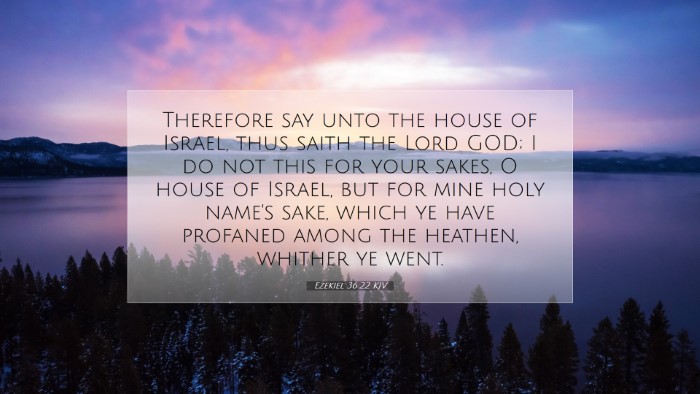Commentary on Ezekiel 36:22
Ezekiel 36:22 (ESV): "Therefore say to the house of Israel, Thus says the Lord God: It is not for your sake, O house of Israel, that I am about to act, but for the sake of my holy name, which you have profaned among the nations to which you came."
Introduction
This verse serves as a pivotal statement within the prophetic ministry of Ezekiel, emphasizing God's commitment to His name and reputation among the nations rather than the merits of Israel itself. Several public domain commentaries provide profound insights into the complexities and implications of this declaration.
Theological Themes
- The Sovereignty of God: Ezekiel underscores God's sovereignty in His actions. Matthew Henry articulates that God's decisions are based on His character and purpose rather than human merit.
- The Holiness of God: Albert Barnes highlights that God's actions will restore His holiness. The profaning of His name by Israel necessitates a divine intervention that re-establishes His glory.
- Divine Restoration: Adam Clarke reflects on how this restoration is an exhibition of God's grace. While Israel has fallen short, God's desire to act faithfully for His name leads to restoration.
Contextual Analysis
The context of this verse is crucial. Ezekiel is prophesying during a time when the Israelites are in exile and have faced divine judgment. The concerns about their national identity and spiritual integrity run deep.
Matthew Henry notes that this pronouncement serves as reassurance to the exiled community about God's continued covenant faithfulness, despite their waywardness.
Moreover, Clarke emphasizes that the motive behind God's forthcoming actions is a demonstration of mercy and a re-establishment of His covenant relationship, revealing God's unwavering faithfulness.
Understanding "My Holy Name"
When God speaks of "my holy name," it highlights the weighty significance of His name as representing His character, essence, and authority. This phrase insists on a clear distinction between divine integrity and human failure.
Matthew Henry's Perspective
Henry remarks that God's name is intertwined with His holiness and righteousness, and when Israel failed, it brought reproach to God among the nations. Thus, the restoration is necessary not only for Israel's sake but to vindicate His name.
Albert Barnes' Insight
Barnes affirms that the name of God must be revered and held in high esteem. The mention of the nations reflects on a larger theological principle: God's reputation before the world is at stake.
The Implications of Divine Action
This passage serves not only to convey God's intent to revive Israel but to remind the people of their calling to be witnesses among the nations.
- Restoration and Renewal: God’s intention to act brings hope for restoration. Henry indicates that this reveals God's willingness to renew His people.
- Mission and Witness: The act of restoring Israel is tied to their purpose amongst the nations. As Barnes points out, the aim is for Israel to reflect God's character and lead the nations to recognize His sovereignty.
- Covenant Faithfulness: Clarke neatly encapsulates the premise of God's unbreakable covenant with Israel. Though they have acted unfaithfully, God remains faithful to His promises.
Application for Today
This verse speaks powerfully to contemporary believers regarding God’s holiness and our responsibility to reflect His character. The implications are manifold:
- Living for God's Glory: As God acts for His name's sake, believers are called to live in a manner that honors Him, driving home the point made by Matthew Henry regarding the importance of our conduct as a testament to God's character.
- Hope Amidst Judgment: In situations of decline or judgment, the faithful can take comfort that God remains active in restoring His people, a message reinforced by both Barnes and Clarke.
- Missional Living: This text compels the church to engage with the world, echoing the understanding of Israel's role as God's witness among the nations. What does it mean for the church to act as a beacon of God's glory today?
Conclusion
Ezekiel 36:22 serves as a rich theological foundation for understanding God's character and purpose in the world. By drawing from the insights of Matthew Henry, Albert Barnes, and Adam Clarke, we see a multi-faceted view of God's holiness, the necessity for restoration, and the enduring implications for His people. As we reflect on this verse, may we seek to honor the name of God in all our actions, drawing others to His glory.


